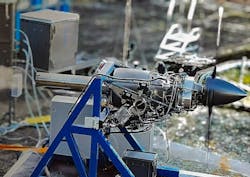Turbotech and Safran test first hydrogen turboprop for light aircraft
VERNON, France - Turbotech in Toussus-le-Noble, France and Safran in Paris completed the first test of a hydrogen-fueled aero gas turbine engine with an ultra-high performance regenerative cycle. The 11 January utilized ArianeGroup’s resources and expertise in preparing and performing tests with hydrogen fuels for space applications at its Vernon test facility in France.
This initial trial was carried out using hydrogen fuel stored in gaseous form. In a second phase later this year, the engine will be coupled to a cryogenic liquid storage system developed by Air Liquide to demonstrate the end-to-end integration of a propulsion system replicating all functions on a complete aircraft.
Turbotech, Elixir Aviation, Safran, Air Liquide and Daher formed the BeautHyFuel joint research project in June 2022 to design and ground test a hydrogen propulsion system rated for light aviation and develop a methodology so it can be certified for retrofit. BeautHyFuel benefits from the unique combination of Turbotech’s ultra-efficient light turbine technologies, Safran’s expertise as an aeroengine manufacturer and fuel system designer, Air Liquide’s cryogenic hydrogen storage technologies for aerospace, Elixir’s role as a manufacturer of innovative fourth-generation light planes, and Daher’s experience in aircraft development, certification, production, and maintenance.
The BeautHyFuel project is supported by the French government and DGAC through France’s post-pandemic stimulus program. It complements other initiatives by Safran to reduce the greenhouse gas emissions of air transport.
“This first experiment carried out using a Turbotech TP-R90 regenerative turboprop engine shows we can convert previously proven internal combustion technologies to create a working zero-carbon solution for general aviation,” said Damien Fauvet, CEO of Turbotech. “As we move to liquid hydrogen fuel, the aim is to offer a high energy-density propulsion system with real commercial applications. Our solution will be readily retrofittable on light airplanes and could have potential in other market segments.”
“This first stage of the project has already gone beyond our expectations,” said Pierre-Alain Lambert, VP Hydrogen Programs for Safran. “Our objective was to validate the behavior of the engine and fuel control system at all phases, from engine start to full throttle, as well as strategies in the event of a failure. For Safran, this kind of small-scale investigation is really valuable, because we can learn quickly and nimbly. It complements our other, larger-scale initiatives aimed at removing the barriers to hydrogen propulsion for air transport, such as our technology demonstration in partnership with CFM International[1] as part of Airbus’s ZEROe program, supported by Clean Aviation. ArianeGroup’s expertise in hydrogen testing was decisive in the timely success of this crucial first step.”
